|
1. How can the
precision
of the Diasensor 1000 be determined ?
2. How can the
relative
accuracy of the Diasensor 1000 be determined ?
3. Which devices
have
been used for the trial ?
4. In which
sequence
were the measurements made ?
5. How many
measurements
have been made ?
6. How do the
devices
look like, used for measurement and how does the place look like, where
the measurements have been made?
7. How precisely
are
the measurements made with Reflolux S, an usual blood glucose
measurement
device as used for blood glucose self control from diabetics in Germany.
8. How precisely
are
the measurements made with HemoCue, a measurement device mainly used in
clinics and from physicians, which was used for the Calibration
of
the Diasensor 1000 ?
9. How precisely
are
the measurements made with the Diasensor 1000?
10. Which
relative
accuracy exists between the invasive HemoCue Meter and the non-invasive
Diasensor
1000 ?
11. What is the
effect
of calm paperwork onto the relative accuracy of the HemoCue and the
Diasensor
1000?
12. What is the
effect
of slow movement and 20 minutes sports in the afternoon on a
hometrainer
onto the relative accuracy of the HemoCue and the Diasensor 1000 ?
13. What is the
effect
of stress onto the relative accuracy of the Diasensor 1000 and the
HemoCue
device ?
14. What is the
effect
of unusual strong movement, 2 hours of sports on a hometrainer, onto
the
relative accuracy of the Diasensor 1000 and the HemoCue device ?
15. Can the
Diasensor
1000 be used to give a warning if the hypoglycaemic blood glucose
region
is reached ?
and
16. What is the
effect
of alcoholics to the relative accuracy of the Diasensor 1000 ?
17. For which
purpose
can the Diasensor 1000 be used ?
18. What causes
the
declining of the correlation shown under certain circumstances like
sports
and after stress ?
19. What is the
reason
why the Diasensor 1000 can not be used to detect or monitor for
hypoglycenmie
( low
blood
sugar)
?
20. Which
possibilities
exist to solve the problem shown and to improve the relative accuracy
of
the non-invasive measurement ?
The precision
of a measuring instrument can be determined by comparison of paired
measurements
made by the same device. Ideally, the paired values from the measuring
instrument should be the same if the time difference between the two
measurements
is short and there is no change in the true value of what is being
measured.
2.
How can the
relative accuracy of the Diasensor 1000 be determined ?
The relative
accuracy
of
a measuring instrument can be determined by comparison of paired
measurements
made by two different instruments.
3.
Which devices
have been used for the trial ?
The following devices were
used
for the comparison
testing
part 1:
1. Reflolux S - an invasive
meter
which uses
familiar
test strips; Boehringer Mannheim Germany.
2. HemoCue - an invasive
meter
which uses a small
cuvette
to hold a blood sample; HemoCue AB, Sweden.
3. Diasensor 1000 -
Noninvasive
Blood Glucose
Meter,
Biocontrol Technology, Inc., Diasense, Inc. ; USA
4.
In which
sequence
were the measurements made ?
The
question
for the sequence
in
which the measurements were made is important, as for the trial the
time
difference between two paired measurements should be as short as
possible,
to achieve that the true value of that what shall be measured, in the
example
the blood-glucose, changes as less as possible.
Tests with the three meters
were
performed in the
following
sequence:
1. Measurement with
Reflolux S
2. Measurement with
HemoCue
3. Measurement with
Diasensor
1000
4. Measurement with
Diasensor
1000
5. Measurement with
HemoCue
6. Measurement with
Reflolux S
Each testing sequence consisted
of 6
single
measurements.
Each sequence took an average of 7 minutes to complete.
5.
How many
measurements
have been made ?
The more measurements a
trial
contains the surer the
results
are and the more precise the measured value is.
A total of 100 testing
sequences
were evaluated over
a
period of more than one month.
In order to compare two measured values
with each other, one can form a correlation coefficient.
This correlation coefficient is obtained by dividing the
two values by each other. Ideally, if both values are
equal, the number 1.00 is obtained. The further away the
correlation coefficient is from 1.00, the greater the
difference between the measured values.
6.
How do the
devices
look like, used for measurement and how does the place look like, where
the measurements have been made?
If the place, where the
measurements are made, is
free
from influences that might desturb the measurements, the values
received
may be more precisely.
Picture of the devices used
for
measurement
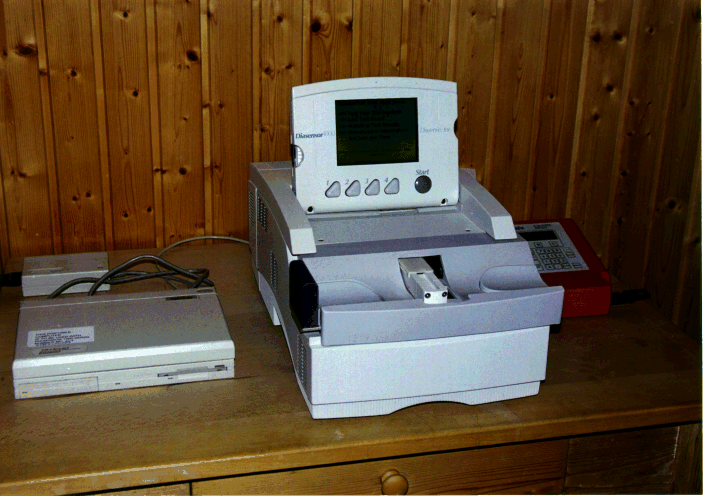
7.
How precisely
are the measurements made with Reflolux S, an usual blood glucose
measurement
device as used for blood glucose self control from diabetics in Germany.
The Reflolux S in the trial
reached a
Correlation-Coefficient
of 0,915, because of this, the difference of two measurements made in
short
time one after the other, was in an average 8,5%.
8.
How precisely
are the measurements made with HemoCue, a measurement device mainly
used
in clinics and from physicians, which was used for the
Calibration
of the Diasensor 1000 ?
The HemoCue in the
trial
reached a
Correlation-Coefficient
of 0,959, because of this, the difference of two measurements made in a
short time one after the other, was in an average 4,1%.
This showes, that the
HemoCue in
the trial, under
the
same conditions, measures more precisely than the Reflolux S.
9.
How precisely
are the measurements made with the Diasensor 1000?
Der The Diasensor 1000 in
the
trial reached a
Correlation-Coefficient
of 0,820, bekause of this, the difference of two mearuements mad in a
short
time one after the other, was in an average 18%.
This showes, that the
Diasensor
1000 in the trial,
under
the same conditions, mesures less precisely than the invasive
measurement
devices.
10.
Which
relative accuracy exists between the invasive HemoCue meter and the
non-invasive
Diasensor
1000 ?
To get the relative accuracy
the
Correlation-Coefficient
for the HemoCue and the Diasensor 1000 was calculated , sit was 0,753.
Thus the difference between
invasive an non-invasive
measurement
method was in an average 24,7%.
To tell it in an example, if
the
HemoCue measures a
bloodglucose
value of 100 mg/dl, it may be, that the Diasensor 1000 measures a
bloodglucose
value of 124,7 mg/dl or 75,3 mg/dl.
It is very important, that
the
difference showed
above
is an average difference and that in in single cases the difference may
be lower but even much higher.
Because of this a second
trial was
performed to find
out,
under which conditions the relative accuracy of the non-invasive
measurement would be low, to find out at least, what disturbes
the
non-invasive measurement ?
Part
2
Evaluation of the relative
accuracy of the Diasensor
1000
Noninvasve Blood Glucose Monitor in defined situations.
Objective:
Objective of the
evaluation
part 2 was, to
find
out, wether the Diasensor 1000 could be used instead of an invasive
blood-glucose
meter for intensified diabetes therapy.
Research
design and methods:
50 paired measurements every
15
minutes on five days
with
definded situations were made. Totally 250 paired measurements were
made.
The days were: 11. 12.
99;
18. 12. 99;
14.01.00;
22.01.00; 28.01.00.
The Diasensor 1000 was used
to get
the noninvasive
measurement
and the HemoCue meter to get the standard measurement.
Correlation coefficients for
every
single pair and
the
average correlation of the days were calculated.
A graphic, that shows a
bloodglucose
dayprofile of the
single day was drawn.
Correlation-Coefficents for
every
single pair of
values
were calculated and the average correlation of the singele days were
calculated.
Grafics were drawn to show the bloodglucose-dayprofile of the days
listed
above.
11.12.99
11. What is
the
effect of calm paperwork onto the relative accuracy of the HemoCue and
the Diasensor 1000?
Situation: As less movement
at
possible.
Paperwork
Values for the 11. December
1999
Time:
HemoCue:
Diasensor
1000: Comment: Correlation:
7:27
3,5
8,83
5N 6B 4 BE 0,396
7:45
3,7
11,8
0,314
7:59
5,9
9,08
Shower
0,605
8:17
9,2
16,5
0,558
8:31
11,9
10,0
0,840
8:44
14,6
13,0
0,890
9:00
16,4
16,4
Working while 1,000
9:17
17,8
18,1
sitting
0,983
9:30
18,5
17,7
0,957
9:46
18,1
20,2
0,896
Average correlation of this 10
Values:
0,748
Time:
HemoCue:
Diasensor
1000: Comment:
Correlation:
10:00
17,6
20,2
0,871
10:15
16,8
21,1
0,796
10:30
15,8
18,8
0,840
10:44
15,0
18,6
0,806
10:59
14,7
18,2
0,808
11:15
13,3
20,9
0,636
11:30
13,0
20,3
0,640
11:44
12,0
18,5
0,649
12:00
11,3
15,8
0,715
12:15
10,8
18,5
0,584
Average correlation of this 10
values:
0,735
Time:
HemoCue:
Diasensor
1000: Comment:
Correlation:
12:30
10,5
18,2
0,577
12:45
9,8
18,0
6N
0,544
12:59
9,2
14,9
0,617
13:15
8,7
15,5
4BE
0,561
13:30
9,3
16,6
0,560
13:42
11,1
14,6
Coffee
0,760
14:01
12,1
15,3
10min Movement 0,791
14:16
13,2
20,2
0,653
14:29
12,4
16,7
0,743
14:46
11,5
14,9
0,772
Average correlation of this 10
values:
0,658
Time:
HemoCue:
Diasensor
1000: Comment:
Correlation:
15:01
10,5
14,6
0,719
15:29
8,9
13,3
0,669
15:43
8,7
17,2
0,506
16:00
8,2
12,8
0,641
16:17
6,9
7,78
0,887
16:33
5,8
8,28
0,700
16:46
5,3
9,28
0,571
17:01
5,0
10,9
0,459
17:13
4,9
12,5
0,392
17:31
4,3
5,45
0,789
Average correlation of this 10
values:
0,633
Time:
HemoCue:
Diasensor
1000: Comment: Correlation:
17:46
3,8
7,05
0,539
18:01
3,3
9,75
0,338
18:16
3,7
7,85
0,471
18:29
3,5
9,25
0,378
18:43
3,4
10,7
2BE 0,318
18:59
5,8
7,27
5N 3BE 0,798
19:16
9,8
11,7
0,838
19:28
10,7
11,6
0,922
19:45
8,4
12,7
0,661
20:01
8,3
16,2
0,512
Average correlation of this 10
values:
0,578
Correlation for the 11.
December
1999
0,670
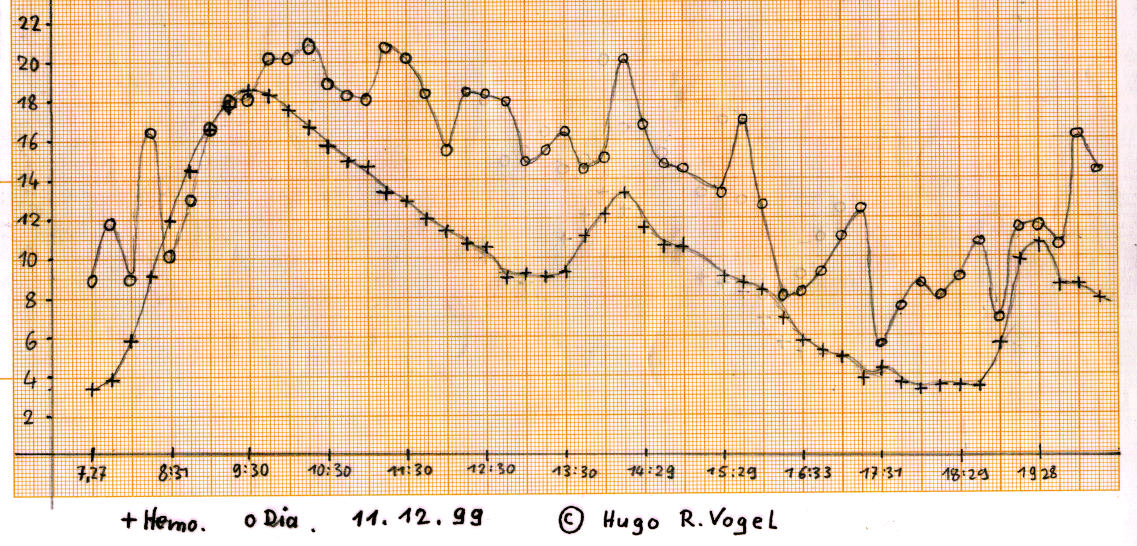
- Viewing the graphic you
see,
that the line,
showing
the movement of bloodglucose measured with the Diasensor 1000, makes
much
more movements than the line showing the movement of bloodglucose
measured
with the HemoCue device.
- In the region where the
bloodglucose values move up
strongly, from 7:27 am to 9:30 am, the line of the bloodglucose values
measured with the Diasensor 1000 followes the line of the bloodglucose
values measured with the HemoCue quite closely. In this region the
values
of the Diasensor 1000 are lower than the values of the HemoCue.
- During the following, slowly
declining line of the
values measured with the HemoCue, the values measured with the
Diasensor
1000 are consequently higher than the values of the HemoCue.
- The declinig of the
bloodglucose
values into the
region
of 5 mmol/l between 17:30 (5:30 pm) and 19:00
( 7:00 pm) is not detected by
the
Diasensor 1000.
18.12.99
12. What is
the
effect of slow movement and 20 minutes sports in the afternoon on a
hometrainer
onto the relative accuracy of the HemoCue and the Diasensor 1000 ?
Situation: Slow movement. 20
minutes sport in the
afternoon.
Values from the 18. December
1999.
Time:
HemoCue:
Diasensor
1000: Comment: Correlation:
6:16
12,8
18,7
5N
6B
0,684
6:32
12,6
13,5
5min gymnastics 0,933
6:46
13,1
21,2
Shower 0,618
7:02
12,4
18,0
2BE Coffee 0,689
7:16
11,0
14,9
0,738
7:27
10,8
17,9
0,603
7:48
11,6
14,0
0,829
8:02
11,5
15,1
0,762
8:14
11,6
14,0
0,829
8:30
9,7
17,4
0,557
Average correlation of this 10
values:
0,724
Time:
HemoCue:
Diasensor
1000: Comment: Correlation:
8:47
6,7
12,5
0,536
8:59
4,6
9,55
0,482
9:17
2,4
11,5
2
BE
0,209
9:31
2,7
4,65
3BE
0,581
9:46
4,8
5,75
0,991
10:01
6,4
7,65
Movement
0,837
10:15
5,2
12,1
0,430
10:32
4,2
7,61
0,552
10:48
4,7
8,41
0,559
11:02
3,7
4,41
0,839
Average Correlation of this 10
values:
0,602
Time:
HemoCue:
Diasensor
1000: Comment: Correlation:
11:16
3,3
4,51
2BE
0,732
11:31
5,1
9,41
0,542
11:46
5,6
5,91
0,948
12:00
5,5
3,31
0,602
12:20
5,0
6,61
0,756
12:32
4,8
2,81
0,585
12:44
4,7
8,71
0,540
13:02
3,9
3,11
1BE
0,797
13:15
3,8
5,31
0,716
13:31
7,6
2,91
0,383
Average correlation of this 10
values:
0,660
Time:
HemoCue:
Diasensor
1000: Comment: Correlation:
13:46
11,2
10,4
Coffee
0,929
14:02
12,6
10,2
0,810
14:18
12,8
14,6
0,877
14:29
13,7
12,4
0,905
14:47
14,1
13,3
0,943
15:00
12,5
17,3
10 min sports 0,723
15:15
9,1
22,8
10 min sports 0,399
15:30
9,0
15,7
0,573
15:46
8,8
10,4
0,846
16:01
8,6
11,1
0,775
Average correlation of this 10
values:
0,778
Time:
HemoCue:
Diasensor
1000: Comment: Correlation:
16:17
7,6
13,6
0,559
16:30
7,6
8,38
0,907
16:43
7,5
7,86
Coffee; stress 0,954
17:02
8,0
6,26
0,783
17:30
7,2
6,26
0,869
17:48
7,4
7,16
0,968
18:16
7,2
7,54
0,955
18:31
7,3
8,94
4N
0,817
18:46
7,4
9,94
0,744
Average correlation of this 10
values:
0,822
Values from the 18. December
1999
0,717
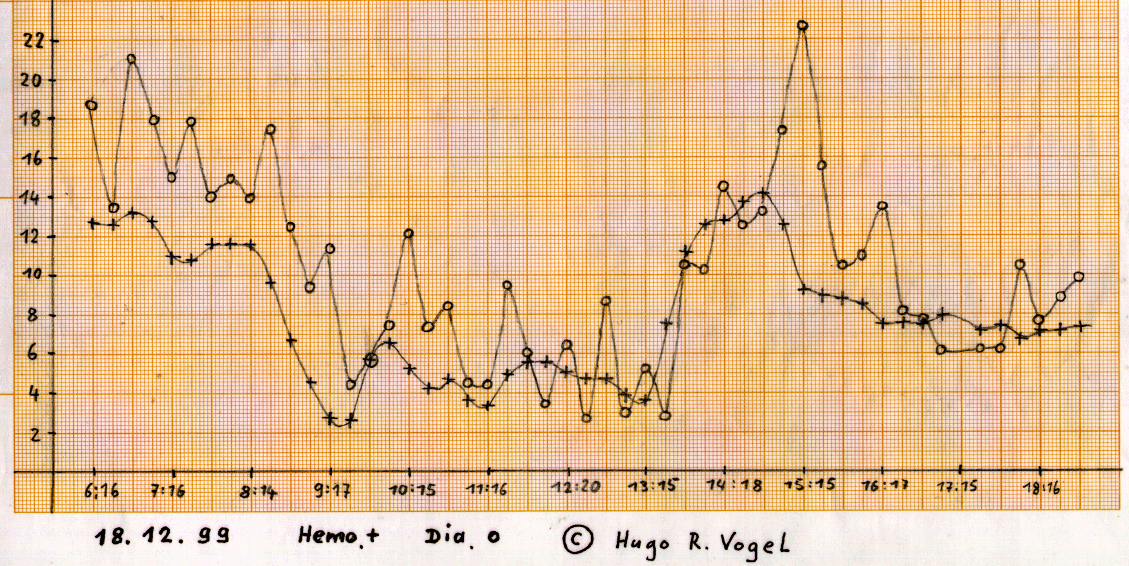
- Viewing the graphic you see,
that
the line, showing
the movement of bloodglucose measured with the Diasensor 1000, makes
much
more movements than the line showing the movement of bloodglucose
measured
with the HemoCue device.
-During the declining of the
line of
values in the
region
from 6:16 a.m. to 9:17 a:m the values of the Diasensor 1000 are higher
than the values of the HemoCue device.
-The Diasensor 1000 does not
detect
the short
hypoglycaemic
region of 3 mmol/l at 9:17 a.m.
- in the region from 11:16 a.m.
to
3:15 p.m. are
sometimes
higher and sometimes lower than the values of the HemoCue device.
- at 15:15 p.m., this is the
time
where 20 minutes
Sport
has been made, the value of the Diasensor 1000 is much higher than the
the value of the HemoCue device.
14. January. 2000
13. What is
the
effect of stress onto the relative accuracy of the Diasensor 1000 and
the
HemoCue
device ?
Situation: little
movement,
no sports,
situation
after a stressing morning with much work.
Values from the 14. January
2000
Time:
HemoCue:
Diasensor
1000: Comments:
Correlation:
13:03
6,4
10,9
5N
0,587
13:15
5,3
9,59
0,553
13:29
4,6
4,34
0,954
13:45
3,7
(lo)4,49
5BE
0,824
14:01
5,5
3,79
0,689
14:19
7,7
(lo)(lo)4,99
0,648
14:31
9,0
3,89
0,432
14:46
8,1
6,69
0,825
14:69
7,5
5,69
0,759
15:15
7,2
3,39
0,5l Water 0,471
Average correlation of this 10
values:
0,674
Time:
HemoCue:
Diasensor
1000:
Comments:
Correlation:
15:30
6,6
5,19
0,786
15:44
6,1
(lo)
5,99
0,982
16:00
5,8
6,36
0,912
16:14
4,1
3,29
2
BE
0,802
16:30
4,6
(lo)4,39
0,954
16:45
5,1
2,99
0,586
17:02
5,0
(lo)(lo)5,09
0,982
17:16
5,3
(lo)(lo)3,99
0,640
17:33
6,4
(lo)4,79
0,748
17:46
5,3
3,29
0,613
Average correlation of this 10
values:
0,805
Time:
HemoCue:
Diasensor
1000:
Comments:
Correlation:
18:01
5,4
3,99
0,5l Water
0,739
18:15
4,7
(lo)3,49
0,743
18:30
4,3
(lo)(lo)(lo) 4N
2BE
0,00
18:45
4,2
(lo)3,79
0,902
19:01
3,9
(lo)(lo)(lo)
3BE
0,0
19:17
4,0
(lo)(lo)4,69
0,853
19:45
6,2
3,29
0,526
20:00
4,9
(lo)(lo)6,86
0,714
20:16
4,4
4,09
0,930
Average correlation of this
10
values:
0,541
Time:
HemoCue:
Diasensor
1000:
Comments:
Correlation:
20:29
3,6
(lo)(lo)(lo)
3BE
0,0
20:46
3,6
4,19
0,859
21:00
4,2
6,69
0,628
21:16
5,1
4,99
0,978
21:29
6,1
2,99
0,490
21:45
6,8
(lo)4,89
0,719
21:59
6,7
(lo)3,09
0,461
22:15
6,6
3,39
0,514
22:31
7,4
(lo)3,89
0,526
22:45
7,9
2,99
0,378
Average correlation of this 10
values:
0,555
Time:
HemoCue:
Diasensor
1000:
Comments:
Correlation:
23:00
7,4
8,29
0,893
23:16
7,6
7,49
0,986
23:30
7,7
(lo)4,69
0,583
23:45
8,3
9,15
0,907
24:00
8,3
7,09
0,854
00:15
9,0
7,09
0,788
00:30
9,2
6,79
0,738
00:45
9,3
9,99
0,921
01:00
9,7
9,79
0,990
01:15
9,4
4,99
0,531
Average correlation of this
10
values:
0,820
Average correlation of the
14.
January.2000
und
15.January
2000
0,679

- Viewing the graphic you
see,
that the line,
showing
the movement of bloodglucose measured with the Diasensor 1000, makes
much
more movements than the line showing the movement of bloodglucose
measured
with the HemoCue device.
- Most values of the Diasensor
1000
in this situation
are lower than the values of the HemoCue.
- In the region of 6:15 p.m. (
18:15)
and 8:30 p.m.
(20:30)
the Diasensor 1000 can not calculate a glucosevalue when even tried
three
times to get a glucose value. The Diasensor shows the message "
out
of range error lo " what means that the device can not show a glucose
value,
as the value would be to low.
22. January 2000
14. What is
the
effect of unusual strong movement, 2 hours of sports on a hometrainer,
onto the relative accuracy of the Diasensor 1000 and the HemoCue device
?
Two hours of sport on a
hometrainer in the morning.
Values from the 22. January 2000
Time:
HemoCue:
Diasensor
1000:
Comment:
Correlation:
06:30
13,4
16,7
QC 16,2 pass 0,802
06:45
14,0
19,7
5N6B
0,711
07:02
13,3
12,3
0,925
07:16
13,8
16,0
0,863
07:30
14,2
13,7
0,965
07:46
14,3
15,8
0,905
08:02
10,8
14,8
3
BE
0,730
08:15
16,3
18,9
10min sports 0,862
08:30
16,2
24,9
10min sports 0,651
08:44
16,6
27,6
10min sports 0,601
0,5 l Water
Average correlation of this
10
values:
0,741
Time:
HemoCue:
Diasensor
1000:
Comment:
Correlation:
08:59
12,8
27,5
10min
sports
0,465
09:15
11,2
26,4
10min
sports
0,424
09:29
8,5
23,8
10min
sports
0,336
09:46
6,5
25,2
10min
sports
0,258
10:00
5,0
24,3
10min
sports
0,206
10:02
4,9
19,8
removed sweat
0,247
with water from arm
10:08
4,3
22,5
hold arm in cold 0,191
water
10:12
4,1
19,2
trainings
end
0,214
10:29
3,1
14,0
shower
3BE
0,221
10:45
2,8
6,6
3
BE
0,424
Average correlation of this 10
values:
0,299
Time:
HemoCue:
Diasensor
1000:
Comment:
Correlation:
11:01
3,4
5,6
0,607
11:14
5,1
4,7
0,461
11:30
7,4
(lo)8,90 short
strong
0,831
movement
11:45
8,5
5,30
0,624
12:00
9,3
7,70
0,828
12:16
10,6
7,50
0,708
12:32
9,5
6,50
0,684
12:46
9,4
6,00
0,638
13:01
8,9
9,60
0,927
13:16
7,5
4,70
0,627
Average correlation of this
10
values:
0,694
Time:
HemoCue:
Diasensor
1000: Comment:
Correlation:
13:34
6,0
3,40
0,567
13:47
5,6
(lo)
3,70
0,661
14:00
5,0
(lo)(lo)5,40
0,926
14:17
4,1
(lo)(lo)4,50
3N
0,911
14:29
3,8
(lo)(lo)(lo)
3BE
0,0
14:44
4,6
(lo)(lo)(lo)
3BE
0,0
15:01
5,5
(lo)3,9
0,355
15:17
6,3
4,20
0,667
15:31
5,7
4,80
0,525
15:46
6,3
6,20
0,984
Average correlation of this
10
values:
0,560
Time:
HemoCue:
Diasensor
1000:
Comment:
Correlation:
16:03
6,3
4,00
0,635
16:32
6,9
4,60
0,667
16:47
7,3
(lo)6,10
0,836
17:04
7,0
3,70
0,529
17:16
7,1
4,40
0,620
17:33
7,7
2,80
0,364
17:46
8,3
4,80
0,578
18:01
8,9
6,80
0,764
18:15
9,2
3,60
0,283
18:30
9,4
(lo)7,80
0,830
Average correlation of this
10
values:
0,611
Average
correlation
for the 22.
January
2000
0,581
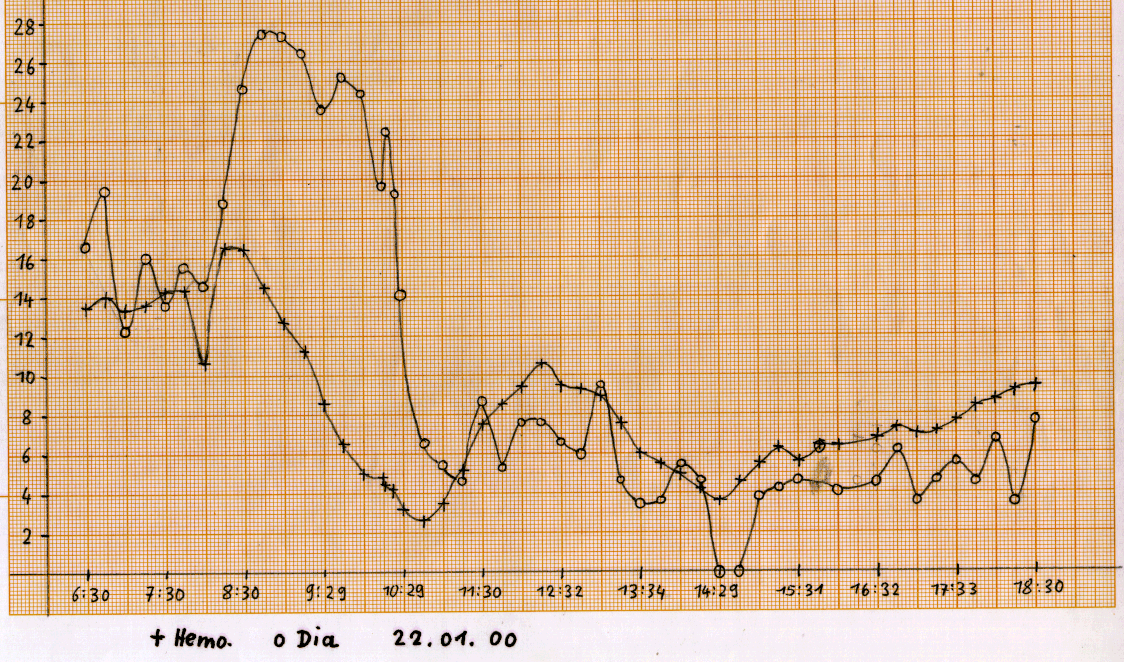
- Viewing the graphic you
see,
that the line,
showing
the movement of bloodglucose measured with the Diasensor 1000, makes
much
more movements than the line showing the movement of bloodglucose
measured
with the HemoCue device.
-During sports in the region
from
8:15 a.m. to 12:12
a.m. a significant difference between the values of the Diasensor 1000
an the values of the HemoCue device is shown. While the values of the
HemoCue
meter show a constant declining of ghe bloodglucose values, what
physiologically
was expected, the Diasensor 1000 shows continuously very high
bloodglucose
levels to nearly 28 mmol/l.
- After the end of training,
the line
of values from
the Diasensor 1000 moves down in a very short time.
The short hypoglycaemic reginon
at
10:45 a.m. is not
detected by the Diasensor 1000.
-After sports in the region
form
11:30 a.m to 6:30 p.m.
( 18:30 ) the values of the HemoCue are mostly higher than the
values
of the Diasensor 1000.
- In the region from 2:29 p.m.
to
2:45 the Diasensor
1000 can not calculate a glucose value when tried three times, but
showes
the message "out of range error lo " what means that the bloodglucose
value
would be so lo, that a measurement is not possible.
28. January 2000
15. Can the
Diasensor
1000 be used to give a warning if the hypoglycaemic blood glucose
region
is reached ?
and
16.
What is
the effect of
alcoholics
to the relative accuracy of the Diasensor 1000 ?
Situation: light
hypoglycaemic
episode in the
afternoon,
after a morning with much stress and work. Effect of 0,5 l red wine in
the afternoon.
Values for the 28. January
2000
Time:
HemoCue:
Diasensor
1000:
Comment:
Correlation:
13:15
10,2
9,7
6N; QC 16,2 pass 0,951
13:32
8,8
8,0
0,909
13:47
8,4
4,7
4BE
0,560
14:00
9,8
3,4
Coffee
0,347
14:16
8,8
2,8
0,318
14:33
8,8
3,7
light movement 0,420
14:47
7,6
5,4
0,711
15:02
6,2
(lo)(lo)3,8
0,613
15:17
5,0
4,0
0,5l
Water
0,800
15:30
4,7
(lo)(lo)4,7
0,959
Average correlation of this
10
values:
0,659
Time:
HemoCue:
Diasensor
1000:
Comment:
Correlation:
15:45
4,2
(lo)(lo)3,7
subjektive
0,881
hypoglycaemie
detected
16:01
2,8
(lo)(lo)(lo)
3BE
0,0
16:18
3,5
(lo)(lo)(lo)
0,0
16:32
5,1
(lo)(lo)(lo)
0,0
16:45
6,3
(lo)(lo)(lo)
0,0
17:02
7,3
(lo)3,8
0,521
17:15
7,9
(lo)4,2
0,532
17:26
7,7
(lo)3,9
0,506
17:46
9,0
(lo)(lo)3,7
0,411
18:02
10,0
(lo)5,4
throath-pain
0,540
Average correlation of this
10
values:
0,339
Time:
HemoCue:
Diasensor
1000:
Comment:
Correlation:
18:17
11,6
7,4
0,638
18:33
12,4
6,6
5N
0,532
18:46
13,3
5,1
0,383
19:02
13,1
7,3
0,557
19:16
11,4
5,4
0,474
19:31
8,0
8,2
3BE
0,976
19:47
5,9
2,9
0,492
20:01
4,6
5,9
1BE
0,780
20:17
5,1
(lo)(lo)(lo)
0,0
20:33
4,8
(lo)4,7
0,979
Average correlation of this
10
values:
0,581
Zeit:
HemoCue:
Diasensor
1000: Correlation: Korrelation:
20:48
4,9
3,4
Glas red wine
0,694
21:02
4,0
4,6
0,870
21:15
4,7
6,8
0,691
21:32
4,8
5,8
0,828
21:45
5,2
3,4
4B 2,5
BE
0,654
22:00
4,3
6,0
0,717
22:15
5,6
8,0
0,700
22:30
6,3
4,7
0,746
22:51
6,9
11,2
0,616
23:03
6,4
5,62
0,878
Average correlation of this 10
values:
0,739
Time:
HemoCue:
Diasensor
1000:
Comment:
Correlation:
23:18
6,2
6,12
0,987
23:32
5,9
(lo)(lo)3,32
0,563
23:45
6,6
(lo)(lo)(lo)
0,0
24:00
6,7
(lo)4,02
0,600
00:15
6,5
(lo)(lo)(lo)
0,0
00:32
6,7
(lo)(lo)7,32
0,915
00:45
7,1
(lo)5,02
0,707
01:01
7,8
(lo)4,92
0,631
01:15
7,4
(lo)7,72
0,959
01:32
6,9
4,82
0,699
Average correlation of this 10
values:
0,606
Average correlation of the 28.
January
2000
0,585
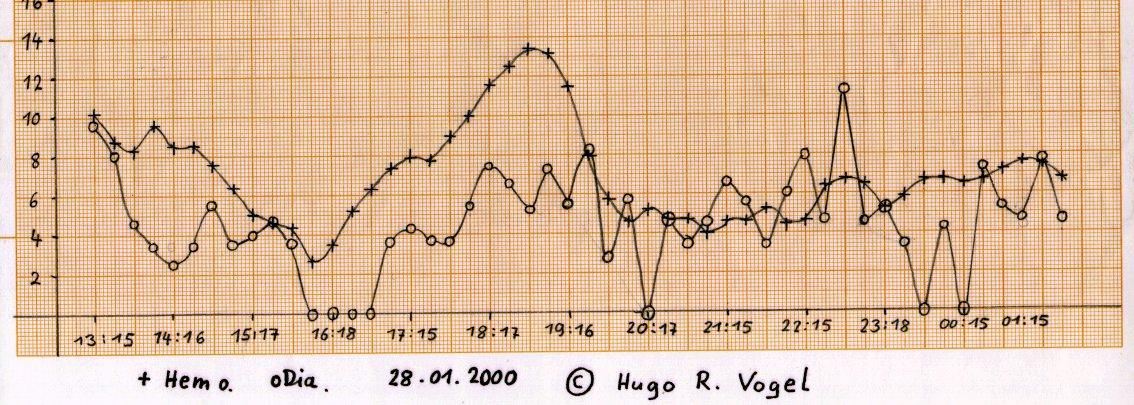
- Viewing the graphic you
see,
that the line,
showing
the movement of bloodglucose measured with the Diasensor 1000, makes
much
more movements than the line showing the movement of bloodglucose
measured
with the HemoCue device.
- In the region from 01:15 p.m.
(
13:15) to 7:30 p.m
( 19:30 ) the values of the Diasensor 1000 are lower than the
bloodglucose
values measured by the HemoCue.
- After the short hypoglycaemic
episode at 04:16 p.m.
( 16:16 ) the Diasensor 1000 can not calculate a glucose value after
trying
three times, but shows for one hour the error message: " out of range
error
lo " what means, that the glucose value could not be measured, as it
would
be to lo.
- after 0,5 l red wine in the
evening, some of the
values
of the Diasensor 1000 in the time region from 08: 30 p.m. ( 20:30 ) to
11:18 p.m. the values of the Diasensor 1000 are higher than the values
of the HemoCue device, after this time they fall below the values of
the
HemoCue.
- At 11:45 p.m. ( 23:45 )
and 0:15
a.m ( 00:15 ) the
Diasensor
1000 can not calculate a glucose value after trying three times, but
shows
for one hour the error message: " out of range error lo " what means,
that
the glucose value could not be measured, as it would be to lo.
- Um 23:45 Uhr und um 00:15 Uhr
kann
der Diasensor 1000
nach dreimaligem erfolglosen Versuch
17. For which
purpose
can the Diasensor 1000 be used ?
11.
June 1999;
Recommendation
of the manufacturer Biocontrol Inc. for the intended use of the
Diasensor
1000.
Last
update
20. Oktober 1999
Biocontrol Technology
recommends
that averages of
blood
glucose test results obtained with the Diasensor 1000 over 2 - 4 weeks
be used by physicians together with other infromation to adjust insulin
dose.
Individual test results
obtained
from the Diasensor
1000
are not intended to be used to adjust insulin dose.
The Diasensor 1000 is not
intended
to be used to
detect
or monitor for hypoglycemia ( low blood sugar).
On behalf of the private
evaluation
above, I want to
join this recommendation in full.
18.
What causes
the declining of the correlation shown under certain circumstances like
sports and after stress ?
19.
What is
the reason why the
Diasensor
1000 can not be used to detect or monitor for hypoglycenmie
( low
blood
sugar) ?
Hypothesis:
1. During sports the
diameter of
the tiny
bloodvessels,
even in the region in which the Diasensor 1000 makes the measurement
with
infrared light, becomes larger. More blood flows through this region
during
sports as usual. Because of this the region where the measurement is
made
contents more blood than usual what causes, that the Diasensor 1000
calculates
a larger amount of blood glucose depending on the lager amount of blood
in the tissue.
2. After hard work or
stress, the
diameter of tiny
blood
vessels even in the region in which the Diasensor 1000 makes the
measurement
with infrared light becomes smaller. Less blood flows through this
region
after hard work or stress as usual. Because of this the region where
the
measurement is made contents less blood than usual what causes, that
the
Diasensor 1000 calculates a lower blood glucose level depending on the
smaller amount of blood in the tissue.
3. If a hypoglycaemia (
episode of
low blood sugar )
occurs
during sports, the Diasensor can not detect the hypoglycaemia, as the
smaller
content of sugar in the blood during hypoglycaemia is overwhelmed by
the
opening of the tiny blood vessels and therefor larger amount of blood
in
the tissue as usual, which the Diasensor 1000 uses for measurement.
4. If hypoglycaemia (
episode of low blood
sugar
) occurs after hard work or stress, the Diasensor calculates to low
blood
glucsoe values for one hour after the hypoglycaemia, as the rising of
the
blood glucose after hypyoglycaemia is overwhelmed by the closing of the
tiny blood vessels and therefor less blood in the tissue as usual,
which
the Diasensor 1000 uses for measurement.
20. Which
possibilities
exist to solve the problem shown and to improve the relative accuracy
of
the non-invasive measurement ?
Proposal to solve the
problem:
To solve the problem, and to
improve the relative
accuracy
of the non-invasive measurement of blood glucoes with infrared
technology,
I want to porpose to measure one or more additional parameters of the
blood
as correcting factors, to detect the amount of blood which the tissue
contents
in the moment where the measurement is made. A correcting factor could
be used to modify the algorythm used for calculating the amount of
blood
glucose dependent of the content of blood in the tissue during
measurement
As parameter the red color
of the
blood,
haemoglobin,
cold be used, or other factors that are found in the blood constantly.
Was this info valuable for you?
You can tell me
thank you. Give me back any amount and show how much the
content in this website is worth to you.
Say thank you
with EURO
As an example donate. 2,50 €
Disclaimer: This page is meant to show opportunities to live a
fulfilled life with diabetes. If you are looking for medical
advice, please consult your doctor or pharmacist.
© Hugo R. Vogel all rights reserved worldwide.
|

